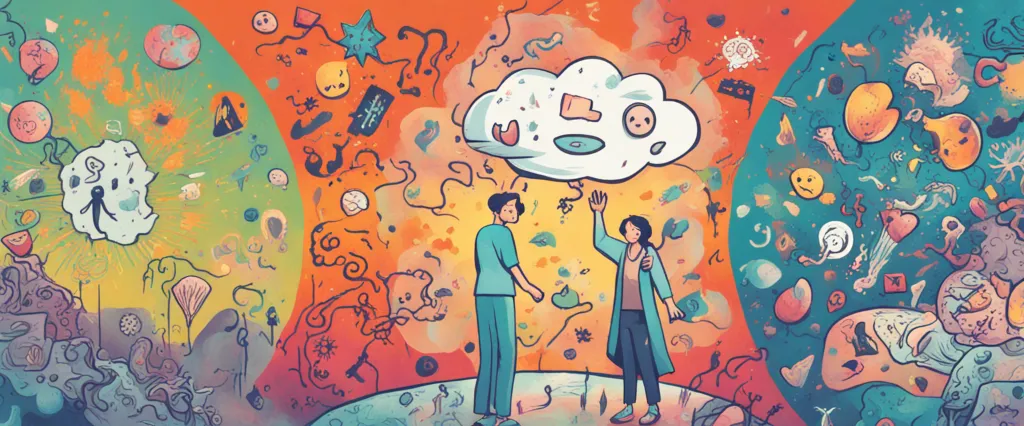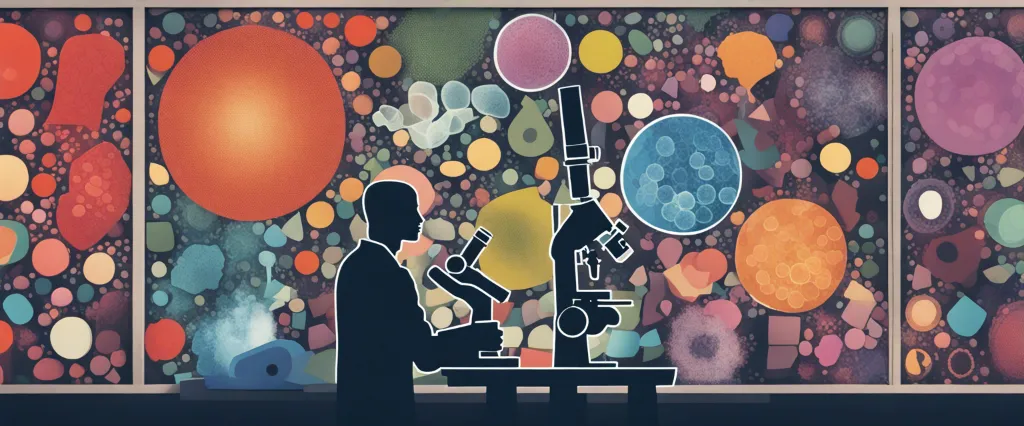——Survival Of The Sickest by Sharon Moalem & The Song of the Cell by Siddhartha Mukherjee

In the realm of scientific literature, Survival of the Sickest by Sharon Moalem and The Song of the Cell by Siddhartha Mukherjee stand as two exceptional works that delve deep into the fascinating and intricate world of human health and disease. While both books share a common theme of human biology, they offer distinctive perspectives and approaches towards understanding our complex cellular makeup. Survival of the Sickest takes readers on an enthralling journey that explores how certain diseases and genetic anomalies have surprisingly played a crucial role in our survival as a species. In contrast, The Song of the Cell paints a vivid and poetic picture of the microscopic wonders within our bodies, revealing the intricate symphony of cells that orchestrate our existence. By examining the information garnered from these compelling and thought-provoking books, we aim to explore the various similarities and differences in the authors’ perspectives, methods, and ideas concerning human biology. Ultimately, this comparative study seeks to uncover the diverse narratives and scientific insights that Moalem and Mukherjee contribute to our understanding of human health and illuminate the fascinating intricacies of our biological existence.
Brief Summary of Two Books
Survival Of The Sickest by Sharon Moalem
Survival of the Sickest” by Sharon Moalem is a non-fiction book that explores the intriguing connection between human diseases and evolutionary adaptation. Moalem challenges conventional wisdom by presenting the idea that many diseases, such as diabetes, hemochromatosis, and malaria, have actually played a crucial role in human survival and evolution throughout history.
Moalem argues that certain diseases are not simply random occurrences, but rather the result of a complex interplay between genetics, environment, and evolutionary pressures. By looking at the intricate mechanisms behind diseases, the author delves into the fascinating evolutionary theories that explain why humans have been susceptible to certain ailments and what advantages these diseases may have provided to our ancestors.
The book covers a wide range of topics, from the role of genetic mutations in shaping human diversity to the history of epidemics and their impact on population genetics. Moalem also explores how certain diseases, like sickle cell anemia or cystic fibrosis, have developed as genetic adaptations to protect against other illnesses. He presents evidence to support the hypothesis that evolutionary processes have given humans a genetic predisposition to certain diseases, resulting in an increased resistance to other, potentially more lethal, infections.
In addition to the biological aspects, Moalem also discusses the social and cultural implications of his research. He addresses the ongoing debate over genetic testing and how understanding the evolutionary basis of diseases can potentially revolutionize healthcare, pharmaceuticals, and medical treatments.
Overall, “Survival of the Sickest” provides readers with a thought-provoking and enlightening perspective on human health and disease, challenging long-held beliefs and shedding light on the intricate relationship between our genes, our environment, and our collective history.
The Song of the Cell by Siddhartha Mukherjee
The Song of the Cell” is a non-fiction book written by Siddhartha Mukherjee, a renowned physician and researcher. Published in 2021, it delves into the complex and fascinating world of cells, exploring their history, roles, and importance in understanding life itself.
Mukherjee begins by tracing the historical journey of cell biology, highlighting key discoveries and scientists’ contributions to our understanding of cells. He introduces readers to seminal figures like Robert Hooke, who first observed cells under a microscope, and Antonie van Leeuwenhoek, known as the father of microscopy.
The book then embarks on an exploration of various aspects of cell biology. Mukherjee explains how cells are the fundamental building blocks of life, describing their structure and diverse functions across different organisms. He explores topics such as cell division, energy production, communication, and the intricate web of interconnections that govern cell behavior.
Taking the reader further into the cellular world, Mukherjee delves into the molecular basis of life, discussing DNA, genes, and the processes of transcription and translation that guide protein synthesis. He showcases the ongoing research efforts to decipher the complexities of the human genome and the potential applications of this knowledge in healthcare and disease prevention.
Throughout the book, Mukherjee weaves in captivating anecdotes and personal stories, blending scientific rigor with captivating storytelling. He examines the historical context and ethical implications of various breakthroughs, such as the discovery of the polio vaccine and the controversy surrounding stem cell research.
“The Song of the Cell” offers readers a comprehensive and accessible overview of the intricate and awe-inspiring world of cells. It emphasizes the significance of cellular biology in understanding life, human health, and disease, while also raising thought-provoking questions about the future of scientific inquiry in this field.
Comparison between Two Books

Similarities in Mysteries of Our Body
In both Survival of the Sickest by Sharon Moalem and The Song of the Cell by Siddhartha Mukherjee, the authors explore the intricacies and mysteries of the human body, shedding light on various aspects of physiology and medicine. They both aim to unravel the hidden complexities of our bodies and understand the remarkable adaptations and functions that enable us to survive.
A key similarity between these books is their focus on the interconnectedness of different biological systems within the body. Moalem and Mukherjee delve into the intricate relationships between various organs, cells, and molecules, highlighting how each component plays a vital role in maintaining overall health and addressing the mysteries that surround these interactions.
Another shared theme is the emphasis on the adaptive nature of the human body in response to various challenges or threats. Both books explore the remarkable resilience and survival mechanisms that our bodies have evolved over time. Moalem delves into the concept of “survival genes,” explaining how certain genetic variations that may produce negative effects under certain circumstances can also confer advantage in different contexts. Mukherjee, on the other hand, investigates the cellular mechanisms through which our bodies adapt and evolve, showcasing the constant battle between health and disease.
Moreover, both authors touch upon the role of genetics and evolution in shaping our bodies’ responses to diseases and environmental factors. They explore inherited diseases, gene mutations, and the impact of natural selection on human physiology. This genetic perspective not only adds to the understanding of our bodies’ mysteries but also opens up new avenues for potential medical interventions and treatment approaches.
Lastly, Moalem and Mukherjee both incorporate historical and anecdotal narratives to engage readers and make complex scientific concepts accessible. They infuse their explanations with real-life stories and examples, providing a personal touch to the exploration of our body’s mysteries.
Overall, both Survival of the Sickest and The Song of the Cell share a common goal of unraveling the mysteries of our bodies and highlighting the complexity and adaptability inherent in our physiological makeup.
Divergences in Mysteries of Our Body
Survival Of The Sickest by Sharon Moalem and The Song of the Cell by Siddhartha Mukherjee are both books that delve into the intricacies of human biology and explore various aspects of our bodies. While both books tackle the mysteries of our body, they diverge in their approaches, focus areas, and overall messages.
One major divergence between the two books is their perspective on the role of evolution in shaping human health. In Survival Of The Sickest, Moalem argues that many seemingly adverse genetic traits have actually provided survival advantages in certain conditions. He explores how diseases such as hemochromatosis and malaria have shaped human evolution. Moalem takes a broad evolutionary view and presents the notion that certain diseases could have positive effects in certain circumstances.
On the other hand, The Song of the Cell by Siddhartha Mukherjee takes a more molecular and cellular perspective. Mukherjee explores the inner workings of DNA, genes, and cells to explain complex biological processes and how they contribute to the health and diseases of the body. While evolution is touched upon in the book, it is not the primary focus. Instead, Mukherjee delves into cellular biology to unravel the mysteries of our body.
Another divergence between the two books is their approach to communicating scientific concepts. Survival Of The Sickest focuses on anecdotal storytelling, using real-life examples to engage the reader. Moalem weaves together history, biology, and medicine to present compelling narratives about the mysteries of our bodies. This approach makes the book accessible to a wide range of readers, including those without a deep scientific background.
In contrast, The Song of the Cell, written by a renowned oncologist and researcher, Siddhartha Mukherjee, takes a more academic approach. Mukherjee presents complex scientific facts, experiments, and discoveries in a detailed and systematic manner. The book aims to educate readers on the complexities of cell biology, often using technical terms and scientific jargon.
Overall, while both Survival Of The Sickest and The Song of the Cell explore the mysteries of our bodies, they differ in their approach, emphasis, and writing style. Survival Of The Sickest takes a broader evolutionary perspective and uses storytelling techniques to engage readers, while The Song of the Cell focuses on cellular biology and presents scientific concepts in a more academic manner. Both books offer valuable insights into human health and the mysteries within, catering to different readers with diverse interests.

Conclusion
Both “Survival of the Sickest” by Sharon Moalem and “The Gene: An Intimate History” by Siddhartha Mukherjee are highly regarded books in the field of biology and genetics. The choice between them ultimately depends on your specific interests and preferences.
“Survival of the Sickest” delves into the concept of how certain diseases and genetic variations have survived throughout evolution, providing potential benefits to humanity. It explores the idea that some illnesses have actually helped human survival. This book offers a unique perspective on the relationship between human biology and diseases.
On the other hand, “The Gene: An Intimate History” by Siddhartha Mukherjee is a comprehensive exploration of the history and impact of genes on society and individuals. It focuses on the science of genetics, the discovery of DNA, and the profound influence genes have on shaping our lives. This book offers a more comprehensive understanding of the field of genetics and its implications.
Ultimately, if you are interested in evolutionary biology and the intricate relationship between humans and diseases, “Survival of the Sickest” by Sharon Moalem would be a worthy read. Conversely, if you prefer a broader understanding of genetics and its history, “The Gene: An Intimate History” by Siddhartha Mukherjee would be a great choice.


